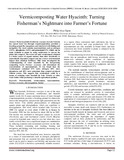Please use this identifier to cite or link to this item:
http://ir-library.mmust.ac.ke:8080/xmlui/handle/123456789/1278| Title: | Vermicomposting Water Hyacinth: |
| Other Titles: | Turning Fisherman’s Nightmare into Farmer’s Fortune |
| Authors: | Ogutu, Philip Ariya |
| Keywords: | Waterhyacinth, vermicompost, macronutrients, Perionyx excavatus, microorganisms, farmer |
| Issue Date: | 1-Jan-2019 |
| Publisher: | MMUST |
| Series/Report no.: | Volume IV, Issue I,; |
| Abstract: | Water hyacinth (Eichhornia crassipes) in Lake Victoria has caused water loss through evapotranspiration, provided a breeding ground for mosquitoes and interfered with fishing and navigation. The weed contains macronutrients such as nitrogen (2.5%), phosphorus (1.0%) and potassium(5.3%) which can be made available to plants by using earthworms to convert the plants into compost. The worm cast and vermicompost obtained is a better source of organic manure than other aerobically or anaerobically degraded compost and has a lower environmental impact than chemical fertilizers. This study investigated the vermicomposting of water hyacinth by the fast-growing composting worm Perionyx excavatus and determined the concentrations of macronutrients. It was found that the vermicompost contained 47% more nitrogen, 60% more phosphorus and 40% more potassium than compost produced without worms. This suggests that vermiculture could be a means of reducing water hyacinth in Lake Victoria or other water bodies while producing a valuable agricultural product. |
| Description: | vermiculture |
| URI: | http://r-library.mmust.ac.ke/123456789/1278 |
| ISSN: | 2454-6194 |
| Appears in Collections: | Journal Articles |
Files in This Item:
| File | Description | Size | Format | |
|---|---|---|---|---|
| Vermicomposting Water Hyacinth Turning.pdf | www.rsisinternational.org | 464.89 kB | Adobe PDF |  View/Open |
Items in DSpace are protected by copyright, with all rights reserved, unless otherwise indicated.
